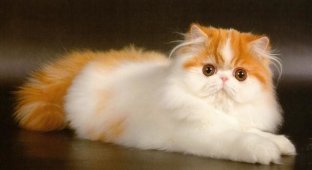The Scottish Fold cat is a very young breed. The first kittens with the signature curved and pressed ears appeared in Britain in the early 60s of the last century. They quickly gained popularity, becoming truly popular favorites in Europe, and then in America.

One of the funniest behavioral features of the Scottish Fold is its favorite upright stance. Very often, cats of this breed like to straighten their backs and stand on their hind legs, like a column. Of course, they don’t do this to see something in the distance or just to seem cute and become Youtube heroes. This way they stretch the spine.
Many Scottish Folds are afraid of heights. This is due to the peculiarities of the structure of their vestibular apparatus. Therefore, when playing, they definitely will not jump from the curtains onto the mezzanine. Scottish Folds love to have fun, but they do it with aristocratic dignity.
The very first cat with folded ears was born in Scotland in 1961 to a semi-wild tabby from an unknown cat on an ordinary village farm. The owners named her Susie.

Susie quickly began to produce offspring, so the owners tried to give kittens to friends and acquaintances. In 1963, Scottish woman Mary Ross received a white cat with unusual ears as a gift from those same farmers. Mary named her Snooks. In turn, in the first offspring of the young cat, a kitten was found that looked as close as possible to the modern Scottish Fold cats in the photo. He was white in color and with weighty legs, and a suitable name was chosen for him - Snowball. Mary, not having the skills and knowledge of a breeder, intuitively felt that she might be dealing with an emerging breed. When Snowball grew up, she decided to cross him with a British Shorthair cat, and his mother Snooks with a British Blue cat. This is how the first full-fledged cats of the Scottish breed were born. Professional geneticists and breeders became interested in envelope ears and helped the owner create an official algorithm for breeding the breed.
By the way, if history is to be believed, Scottish Folds are not the first cats with curled ears. The great scientist Charles Darwin wrote in his research diaries and scientific papers in 1855: “I have received information about an unknown Chinese breed of cats with hanging ears. Most likely, this is caused by a rare dominant mutation.”
In recent decades, the Scottish Fold cat has become one of the most popular and affordable pets around the world. But geneticists have spent a lot of effort to normalize the failure in the breed's gene pool caused by crossing Scots with American and British shorthair cats. Often such unions led to serious disorders of the musculoskeletal system if both parents were lop-eared. Therefore, it was decided to breed these cats in a heterozygous format (i.e. with the help of male or female Scots without folded ears - Scottish Straights).

In most cases, Scottish Fold kittens are born with ears of the most normal shape. The ears begin to curl and bend only four weeks after the baby is born.
In most cases, Scottish Fold kittens are born with ears of the most normal shape. The ears begin to curl and bend only four weeks after the baby is born.
Fold cats are playful and relatively active – especially when they are young. They easily get used to the hands of the owner. These animals are characterized by a tendency to basic training. They grasp the living conditions in the house on the fly - they quickly understand what a scratching post is, and sometimes they can even watch TV.

The Scottish Fold breed has not only a very high level of intelligence, but also developed natural intuition, as well as adaptability. They quickly get accustomed to a new environment and carefully monitor the mood of their owners, subtly adapting to a person’s different emotional states. These animals show virtually no aggression, pettiness or vindictiveness.
The Scottish Fold cat can boast of an extremely stable character. He does not succumb to emotional waves and cat hysteria. These cats are very attached to the comfort of home and people, but are very unpretentious and independent animals.

One of the characteristics of the Scottish Fold breed is its unusual voice. It is not at all like the usual purring and is quite creaky. Usually the Scots do not shout if they need something, but politely inform about it using a sophisticated dialect.
Cats often behave strangely in conflict situations - they show aggression, hiss and cower, clinging to the ground. But this certainly does not apply to the diplomatic Scots, who always take a neutral position. They would make excellent politicians.
Scottish Fold cats become attached to people very quickly. Experienced breeders claim that they are especially fond of older people and small children. If the Scots really like someone, they will follow him throughout the apartment and try to attract attention to themselves. At the same time, the Scots always know when to stop and will not brazenly jump on their hands, distracting them from business. The main thing for them is just to be close to the owner.

Other cats in the house are not a problem for the Scots. On the contrary, they will be glad to be in good company. Even if a dog lives next to them, they tolerate it calmly. Some fold-eared owners deliberately purchase another animal, most often a dog, so that the cat has a faithful companion in games and home entertainment.
As a rule, the Scottish Fold cat reacts poorly to shouting at him. Due to several cases of unreasonable screaming by the owner, the cat can change for the rest of its life - it will be afraid of people, aggression will awaken in it.

The owner should not allow himself to act rudely. Many people, for example, like to carry cats by the scruff of the neck. But the Scots will not tolerate this. Firstly, they are quite heavy and feel pain if they are carried in this way. Secondly, it is very harmful to their spine. Scotch cats (as, indeed, all cats) need to be carried so that each of the paws has support in the air.
When raising and training Scots, the owner needs to be patient. A person must understand that this cat is not a shepherd dog or a poodle: she cannot remember many commands at one time simply physically. You need to gradually, slowly but surely learn commands with your cat one after another, from simple to complex - without haste or confusion.
Walking and exercise
Scottish Fold cats are a purely domestic breed. They are initially adapted for a comfortable life in apartments, but sometimes they still need walks and appropriate physical activity.
Owners of Scottish cats should take care to ensure that these cats need regular activity and movement. It won't be difficult for you. Therefore, it is advisable that light exercise be done daily. This will improve the health of Scottish cats and keep them in good spirits and in good physical shape throughout their lives.
First of all, you need to think about toys and gymnastic devices. Some of them can be bought at a pet store, others can be easily made by yourself. Everyone knows about cats’ love for all kinds of cardboard boxes. You can stack several boxes on top of each other, after cutting a round hole in each of them so that the cat can use it as an entrance and exit.

It is also useful to make structures from wooden sticks fastened together in the form of a ladder. Almost all cats love to climb. The Scots are no exception. These exercises not only make the animals happy, but also strengthen their vestibular apparatus.
Scottish Fold cats love to walk in the garden. Animals should smell the flowers and chase flies to their heart's content. After all, no one has canceled the instincts of a predator, even among such homebodies as the Scots.
Scottish Fold cats practice their own version of yoga. They sit comfortably in a meditative position and stretch their paws forward. Then they slowly lie on their back and rise sharply in a column position, reminiscent of meerkats.
Scottish Fold cats practice their own version of yoga. They sit comfortably in a meditative position and stretch their paws forward. Then they slowly lie on their back and rise sharply in a column position, reminiscent of meerkats.

In general, breeders claim that Scottish Fold cats are not the most demanding breed in terms of grooming. The coat needs to be brushed every day. Scots quickly get used to a brush (especially a massage brush), and this process has a beneficial effect on their mood.
Contrary to the popular stereotype, these cats behave quite calmly during water procedures. As a rule, they get used to the water after several baths. But they should only be washed if absolutely necessary - for example, if fleas appear or the Scotsman gets too dirty.
The special shape of the ears allows wax and dust to accumulate in them. Therefore, you need to examine your ears at least two to three times a month. When cleaning, use a cotton swab moistened with a special ear canal hygiene liquid from a pet store.

Fold-eared cats need their claws trimmed several times a month. For more proper care, purchase a good scratching post and a steel nail clipper. Each claw needs to be trimmed by two millimeters, this will be quite enough. Do not use scissors under any circumstances - you can harm living tissue and even nerve endings.
The tray must match the size of the Scotsman. It is advisable that the toilet is well fixed to the floor. The tray should be washed daily, but without using products with an aggressive chemical odor.
The scratching post should be high - several tens of centimeters higher than a Scot standing on his hind legs and stretched out to his full height. It is best to use a stable and durable pole, because usually it is used not only for grinding down claws, but also for games.

The sleeping area should be appropriate for your pet's size, tall, soft and round. It is advisable that lightweight organic materials be used as filler for a pillow or comfortable bed. It is best to place a cat's apartment near a wall or closet so that your pet feels safe and can lean on something. Also, taking care of the health of Scottish cats, you should prevent the slightest drafts in the house. These animals are very prone to colds.
The basis of natural nutrition is fresh beef meat or offal (beef, chicken kidneys, lungs, heart). Liver and poultry meat are allowed only in boiled form. Preferably sea fish, low-fat varieties, also boiled. Kefir and cottage cheese are suitable dairy products. Cream and sour cream have too high a fat content and, if consumed frequently (more than 2 times a week), cause liver disease. The most useful cereals for Scottish Fold cats are oats, millet and rice. They are cooked in weak meat broth or milk. You can add meat pieces or, occasionally, egg yolk to the porridge.

























